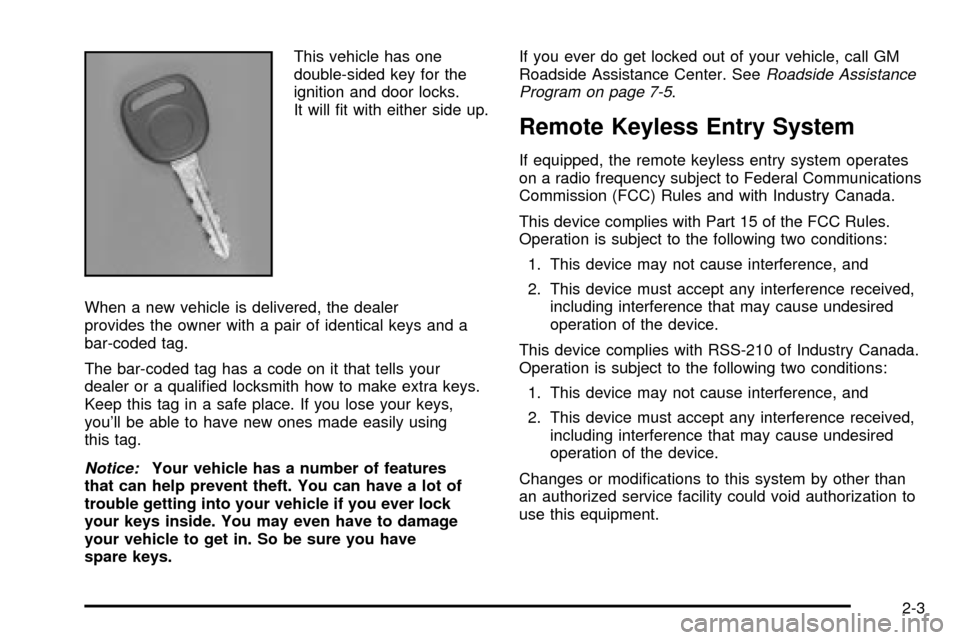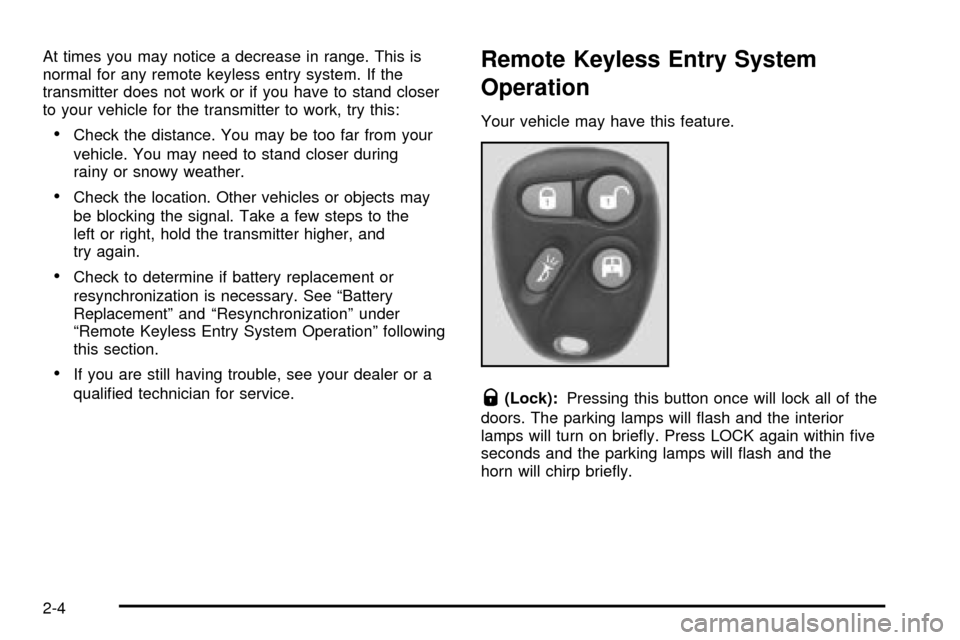Page 31 of 386

The best way to protect the fetus is to protect the
mother. When a safety belt is worn properly, it's more
likely that the fetus won't be hurt in a crash. For
pregnant women, as for anyone, the key to making
safety belts effective is wearing them properly.
Right Front Passenger Position
To learn how to wear the right front passenger's safety
belt properly, seeDriver Position on page 1-16.
The right front passenger's safety belt works the same
way as the driver's safety belt ± except for one thing.
If you ever pull the shoulder portion of the belt out all the
way, you will engage the child restraint locking feature.
If this happens, just let the belt go back all the way
and start again.
Center Passenger Position
(2nd Row)
If your vehicle has a second row bench seat, someone
can sit in the center position. When you sit in the
center position in the second row bench seat, you have
a lap-shoulder belt which works the same way as the
rear seat outside passengers' belts. To learn how
to wear a lap-shoulder belt see, ªLap-Shoulder Beltº
under
Rear Seat Passengers on page 1-28.
1-25
Page 35 of 386
1. Pick up the latch plate and pull the belt across you.
Don't let it get twisted.
2. Push the latch plate into the buckle until it clicks.
Pull up on the latch plate to make sure it is secure.
When the shoulder belt is pulled out all the way
you will engage the child restraint locking feature. If
this happens, just let the belt go back all the way
and start again.If the belt is not long enough, see
Safety Belt
Extender on page 1-33.
Make sure the release button on the buckle is
positioned so you would be able to unbuckle the
safety belt quickly if you ever had to.
3. To make the lap part tight, pull down on the buckle
end of the belt as you pull up on the shoulder part.
1-29
Page 36 of 386
The lap part of the belt should be worn low and snug on
the hips, just touching the thighs. In a crash, this
applies force to the strong pelvic bones. And you'd be
less likely to slide under the lap belt. If you slid under it,
the belt would apply force at your abdomen. This
could cause serious or even fatal injuries. The shoulder
belt should go over the shoulder and across the
chest. These parts of the body are best able to take belt
restraining forces.
The safety belt locks if there's a sudden stop or a crash.
{CAUTION:
You can be seriously hurt if your shoulder belt
is too loose. In a crash, you would move
forward too much, which could increase injury.
The shoulder belt should ®t against your body.
To unlatch the belt, just push the button on the buckle.
1-30
Page 61 of 386
4. Pull the rest of the shoulder belt all the way out of
the retractor to set the lock.5. To tighten the belt, feed the shoulder belt back into
the retractor while you push down on the child
restraint. If you're using a forward-facing child
restraint, you may ®nd it helpful to use your knee to
push down on the child restraint as you tighten
the belt.
6. Push and pull the child restraint in different
directions to be sure it is secure.
To remove the child restraint, just unbuckle the vehicle's
safety belt and let it go back all the way. The safety
belt will move freely again and be ready to work for an
adult or larger child passenger.
1-55
Page 67 of 386
4. Buckle the belt. Make sure the release button is
positioned so you would be able to unbuckle the
safety belt quickly if you ever had to.5. Pull the rest of the lap belt all the way out of the
retractor to set the lock.
1-61
Page 83 of 386

Keys...............................................................2-2
Remote Keyless Entry System.........................2-3
Remote Keyless Entry System Operation...........2-4
Doors and Locks.............................................2-7
Door Locks....................................................2-7
Power Door Locks..........................................2-8
Cargo Door Relocking.....................................2-8
Rear Door Security Locks................................2-8
Lockout Protection........................................2-10
Leaving Your Vehicle....................................2-10
Sliding Side Door..........................................2-11
60/40 Swing-Out Side Door............................2-13
Rear Doors..................................................2-14
Windows........................................................2-16
Manual Windows..........................................2-16
Power Windows............................................2-17
Swing-Out Windows......................................2-18
Sun Visors...................................................2-19
Theft-Deterrent Systems..................................2-19
Passlock
ž....................................................2-19Starting and Operating Your Vehicle................2-20
New Vehicle Break-In....................................2-20
Ignition Positions..........................................2-20
Starting Your Engine.....................................2-22
Engine Coolant Heater..................................2-23
Automatic Transmission Operation...................2-24
All-Wheel Drive............................................2-26
Parking Brake..............................................2-26
Shifting Into Park (P).....................................2-26
Shifting Out of Park (P).................................2-29
Parking Over Things That Burn.......................2-29
Engine Exhaust............................................2-30
Running Your Engine While You Are Parked. . . .2-30
Mirrors...........................................................2-31
Manual Rearview Mirror.................................2-31
Outside Manual Mirror...................................2-31
Outside Remote Control Mirror.......................2-32
Outside Camper-Type Mirrors.........................2-32
Outside Power Mirrors...................................2-33
Outside Convex Mirror...................................2-34
Outside Heated Mirrors..................................2-34
OnStar
žSystem.............................................2-35
Storage Areas................................................2-36
Section 2 Features and Controls
2-1
Page 85 of 386

This vehicle has one
double-sided key for the
ignition and door locks.
It will ®t with either side up.
When a new vehicle is delivered, the dealer
provides the owner with a pair of identical keys and a
bar-coded tag.
The bar-coded tag has a code on it that tells your
dealer or a quali®ed locksmith how to make extra keys.
Keep this tag in a safe place. If you lose your keys,
you'll be able to have new ones made easily using
this tag.
Notice:Your vehicle has a number of features
that can help prevent theft. You can have a lot of
trouble getting into your vehicle if you ever lock
your keys inside. You may even have to damage
your vehicle to get in. So be sure you have
spare keys.If you ever do get locked out of your vehicle, call GM
Roadside Assistance Center. See
Roadside Assistance
Program on page 7-5.
Remote Keyless Entry System
If equipped, the remote keyless entry system operates
on a radio frequency subject to Federal Communications
Commission (FCC) Rules and with Industry Canada.
This device complies with Part 15 of the FCC Rules.
Operation is subject to the following two conditions:
1. This device may not cause interference, and
2. This device must accept any interference received,
including interference that may cause undesired
operation of the device.
This device complies with RSS-210 of Industry Canada.
Operation is subject to the following two conditions:
1. This device may not cause interference, and
2. This device must accept any interference received,
including interference that may cause undesired
operation of the device.
Changes or modi®cations to this system by other than
an authorized service facility could void authorization to
use this equipment.
2-3
Page 86 of 386

At times you may notice a decrease in range. This is
normal for any remote keyless entry system. If the
transmitter does not work or if you have to stand closer
to your vehicle for the transmitter to work, try this:
·Check the distance. You may be too far from your
vehicle. You may need to stand closer during
rainy or snowy weather.
·Check the location. Other vehicles or objects may
be blocking the signal. Take a few steps to the
left or right, hold the transmitter higher, and
try again.
·Check to determine if battery replacement or
resynchronization is necessary. See ªBattery
Replacementº and ªResynchronizationº under
ªRemote Keyless Entry System Operationº following
this section.
·If you are still having trouble, see your dealer or a
quali®ed technician for service.
Remote Keyless Entry System
Operation
Your vehicle may have this feature.
Q(Lock):Pressing this button once will lock all of the
doors. The parking lamps will ¯ash and the interior
lamps will turn on brie¯y. Press LOCK again within ®ve
seconds and the parking lamps will ¯ash and the
horn will chirp brie¯y.
2-4